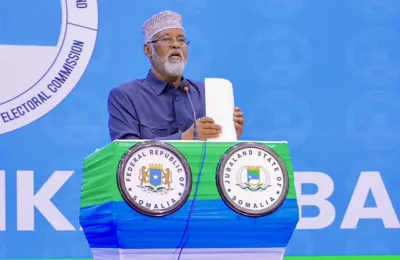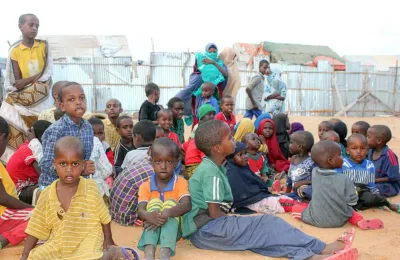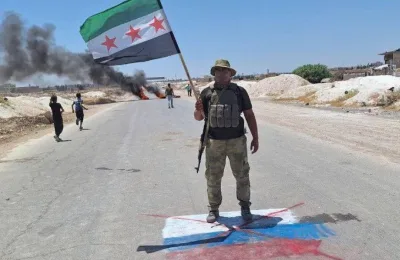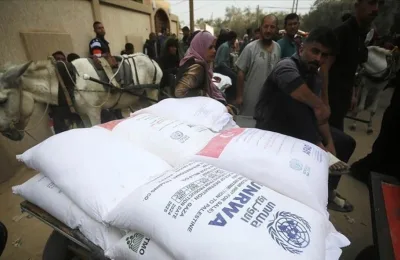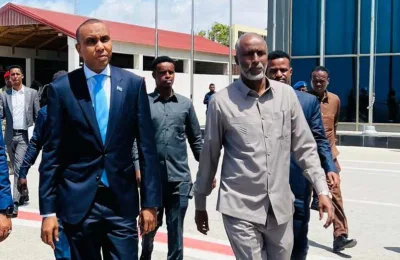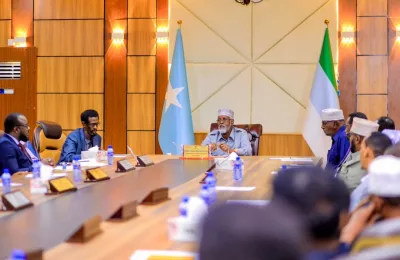U.N. investigators have accused an advisor to Somalia’s president of involvement in the unauthorized diversion of…

U.N. investigators have accused an advisor to Somalia’s president of involvement in the unauthorized diversion of Somali government weapons to Islamist militants with ties to al Qaeda, according to a confidential new report seen by Reuters.
The accusation by the Somalia-Eritrea Monitoring Group, an eight-member panel of independent experts that oversees compliance with U.N. sanctions on the two countries, was included in the group’s 482-page annual report to the U.N. Security Council’s Somalia-Eritrea sanctions committee.
The charge concerns Musa Haji Mohamed Ganjab, a prominent Somali businessman. In an email to Reuters, Ganjab denied the monitors’ allegation, saying it was an attempt to undermine the Somali government and part of a campaign by the panel’s coordinator, Jarat Chopra, to destabilize Somalia.
Ganjab dismissed the monitoring group’s charges and said they were part of a campaign by the panel’s coordinator, Jarat Chopra, to destabilize Somalia.
“I categorically deny this allegation in the strongest possible terms,” he said in an email to Reuters. “I have at no time, and in no capacity, ever been involved in any way in the trafficking of arms to anyone.
“I must conclude that this false claim arises from Mr. Chopra’s political effort to undermine the Somali government and anyone, like myself, who assisted in repudiating Mr. Chopra’s reckless reporting in 2013,” he said.
Chopra did not respond immediately to a request for comment. In the past he has responded to similar accusations by saying that he stood by the monitoring group’s findings.
Reuters could not confirm the monitors’ allegations. If a connection to the siphoning of arms to al Shabaab is confirmed, analysts and diplomats say it could cast further doubt on President Hassan Sheikh Mohamud and his administration. This could scare off foreign donors who have pledged billions to rebuild his shattered nation after two decades of chaos.
“The Monitoring Group has obtained evidence implicating Musa Haji Mohamed ‘Ganjab’, who acted as an adviser to the President, … in the leakage of weaponry to al Shabaab and other forces beyond the army,” the report said.
The monitoring group’s report also said that Somali army weapons and ammunition continue to be diverted to open markets despite government pledges to prevent this.
The report said the evidence against Ganjab is described in detail in a “strictly confidential” annex not included in the version of the report that will be published.
“OUR BROTHERS WHO FOUGHT WITH US”
Reuters has not seen that annex but a July 2014 letter from the monitors to the Somalia-Eritrea sanctions committee, also seen by Reuters, cited email correspondence as evidence of Ganjab’s prior al Shabaab link.
The July letter from the monitoring group included an unofficial translation of a Oct. 8, 2010 email to Ganjab that suggested he was in direct contact with al Shabaab, a militant Islamist group that has been fighting the Somali government for years and is listed as a terrorist organization by the U.S. State Department.
The email sent was attributed to two senior al Shabaab members: Hussein Ali Fidow, deputy head of political affairs, and Ali Muhammad Hussein Ali ‘Jabal’ but sent from another account. Neither man was immediately available for comment.
The email described Ganjab as one of “our brothers who fought with us.” It added that: “the support you give us today will be recorded in history … We will invite you to a peaceful Mogadishu after we have chased away the enemy.” The email also requests medical supplies and ambulances to evacuate the wounded.
According to diplomatic sources, the annex on Ganjab in the monitors’ report describes corroborating evidence for his 2010 exchange with al Shabaab, as well as evidence documenting Ganjab’s longtime involvement in arms procurement activities.
In July, the monitors identified Ganjab as one of several parties set to receive a cut of frozen Somalia assets recovered abroad. The group described the plan as a conspiracy to divert previously Somali assets out of the reach of the central bank, making it difficult to track their disbursement.
In addition to Ganjab, the monitoring said the conspiracy included Somalia’s president, the U.S. law firm Shulman Rogers and the former foreign minister. They all vehemently denied the existence of such a conspiracy.
Shulman Rogers did not comment on the latest report of the monitoring group. But Jeremy Schulman, an attorney at the Maryland-based firm, has previously told Reuters he saw no possibility that Ganjab was associated with al Shabaab and joined Ganjab in questioning Chopra’s credibility.
Schulman said Chopra was not a “reliable source for truthful information about the goings-on in Somalia.”
The monitoring group in July described Ganjab as one of two key facilitators who were “serving as a regular channel between Shulman Rogers and the president” on the question of recovering frozen assets.
The group’s 2013 report said individuals in Mohamud’s government used the Somali central bank as a personal “slush fund”, with an average 80 percent of withdrawals made for private purposes. The presidency and the then-central bank governor Abdusalam Omer have strongly denied that accusation.
The Security Council imposed an arms embargo on Somalia in 1992 to cut the flow of weapons to feuding warlords, who a year earlier had ousted dictator Mohamed Siad Barre and plunged the country into civil war. In 2012, Somalia held its first vote since 1991 to elect a president and prime minister.
Source: Reuters


